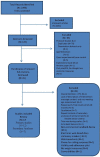A systematic review and meta-analysis of mobile devices and weight loss with an intervention content analysis
- PMID: 25563356
- PMCID: PMC4263963
- DOI: 10.3390/jpm4030311
A systematic review and meta-analysis of mobile devices and weight loss with an intervention content analysis
Abstract
Introduction: Overweight and obesity constitute leading global public health challenges. Tackling overweight and obesity by influencing human behaviour is a complex task, requiring novel emerging health psychology interventions. The aims of this review will be to determine whether mobile devices induce weight loss and improvements in diet and physical activity levels when compared with standard controls without a weight loss intervention or controls allocated to non-mobile device weight loss interventions.
Methods: A systematic review on mobile devices and weight loss was conducted. The inclusion criteria were all randomized controlled trials with baseline and post-intervention weight measures in adult subjects >18 years of age without pre-specified co-morbidities. Mobile device specifications included modern, portable devices in the form of smartphones, PDAs, iPods, and Mp3 players. Cohen's d for standardized differences in mean weight loss was calculated. A random effects meta-analysis was generated using Comprehensive meta-analysis software. Theories and intervention content were coded and analysed.
Results: A total of 17 studies were identified, of which 12 were primary trials and 5 were secondary analyses. The meta-analysis generated a medium significant effect size of 0.430 (95% CI 0.252-0.609) (p-value ≤ 0.01), favouring mobile interventions. Throughout the systematic review, mobile devices were found to induce weight loss relative to baseline weight. When comparing them with standard no intervention controls as well as controls receiving non-mobile weight loss interventions, results favoured mobile devices for weight loss. Reductions in Body mass index, waist circumference, and percentage body fat were also found in the review. Improvements in the determinants of weight loss in the form of improved dietary intake and physical activity levels were also found. Theory appears to largely inform intervention design, with the most common theories being Social Cognitive Theory, Elaboration Likelihood Theory, Control Theory, and Goal Theory. The use of behavioural change techniques was widespread across the studies, with a minimum of five per intervention.
Conclusion: Mobile devices appear to induce positive changes in the behavioural determinants of weight and subsequently are associated with weight loss. Mobile device interventions are heavily informed by theory and behaviour change techniques. The use of theory appears to effectively enhance levels of constructs targeted by interventions.
Figures
References
-
- The World Health Organization Global Health Observatory. Obesity situation and trends. [(accessed on 20 June 2013)]. Available online: http://www.who.int/gho/ncd/risk_factors/obesity_text/en/
-
- The Global Burden of Disease Study 2010. [(accessed on 10 January 2013)];Lancet. 2012 380:9589. Available online: http://www.thelancet.com/themed/global-burden-of-disease.
-
- The World Health Organization Promoting fruit and vegetable consumption around the world. 2013. [(accessed on 20 June 2013)]. Available online: http://www.who.int/dietphysicalactivity/diet/en/index.html.
-
- The World Health Organization Physical activity. 2013. [(accessed on 20 June 2012)]. Available online: http://www.who.int/dietphysicalactivity/pa/en/index.html.
Publication types
LinkOut - more resources
Full Text Sources
Other Literature Sources






